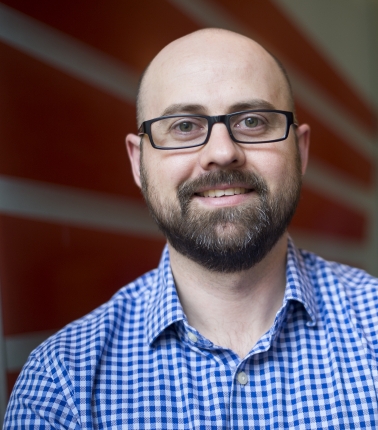
Departmental Affiliations
Affiliated
Philip Jordan, PhD, studies how cells accurately pass on their DNA from one generation to the next and the diseases that are caused when this goes wrong.
Contact Info
615 N. Wolfe Street, Room E8626
Baltimore
Maryland
21205
US
+1 (410) 955 2926
Research Interests
Genome maintenance; Meiosis; Embryonic stem cells; DNA recombination; Chromosome segregation; Structural Maintenance of Chromosomes (SMC); SMC5/6; Cohesin, Condensin; Synaptonemal complex; Polo-like kinase (PLK); Aurora kinase (AURK)
Additional Links
Experiences & Accomplishments
Education
PhD
University of Edinburgh
2006
BS
Flinders University of South Australia
2001
Overview
Research in the Jordan laboratory focuses on understanding the molecular mechanisms regulating DNA repair, chromosome segregation and cell cycle progression. Their lab studies the importance of Structural Maintenance of Chromosomes (SMC) complexes and cell cycle kinases, particularly Polo-like (PLK) kinases and Aurora kinases. The Jordan lab uuse mouse as a model organism to study consequences of gene mutation and chromosome missegregation, which give rise to physical and mental developmental defects, infertility and cancer predisposition. They also use mouse and human pluripotent stem cells to help define the function of these proteins within essential molecular pathways of the cell.
Current research from the Jordan laboratory encompasses the following:
1) Gametogenesis (spermatogenesis and oogenesis)
2) Pluripotent stem cell preservation, proliferation, and differentiation
3) Neurodevelopment
Current research from the Jordan laboratory encompasses the following:
1) Gametogenesis (spermatogenesis and oogenesis)
2) Pluripotent stem cell preservation, proliferation, and differentiation
3) Neurodevelopment
Honors & Awards
2021: R01 NIH Research Grant, NIGMS
2019: R03 NIH Research Grant, NINDS
2018: Johns Hopkins University Catalyst Award
2017: KY Cha Award in Stem Cell Technology, ASRM
2017: Johns Hopkins Discovery Award
2017: R21 NIH Research Grant, ORIP
2016: R01 NIH Research Grant, NIGMS
2015: Johns Hopkins University Discovery Award
2014: Ho-Ching Yang Memorial Faculty Fellowship in Cancer Prevention
2013: R00 NIH Pathway to Independence Award, NICHD
2011: K99 NIH Pathway to Independence Award, NICHD
2010: US-UK Fulbright Distinguished Scholar Award, US-UK Fulbright Commission
2006: Federation of European Biochemical Societies Research Award
2005: Society for General Microbiology President’s Research Award and post-funding prize
2005: European Unions’ ERASMUS Student Mobility Award
2004: British Council - Austrian Academic Research Collaboration Award
2002: Darwin Trust International PhD Scholarship, University of Edinburgh, Scotland
______________________________________________________________________________
2019: R03 NIH Research Grant, NINDS
2018: Johns Hopkins University Catalyst Award
2017: KY Cha Award in Stem Cell Technology, ASRM
2017: Johns Hopkins Discovery Award
2017: R21 NIH Research Grant, ORIP
2016: R01 NIH Research Grant, NIGMS
2015: Johns Hopkins University Discovery Award
2014: Ho-Ching Yang Memorial Faculty Fellowship in Cancer Prevention
2013: R00 NIH Pathway to Independence Award, NICHD
2011: K99 NIH Pathway to Independence Award, NICHD
2010: US-UK Fulbright Distinguished Scholar Award, US-UK Fulbright Commission
2006: Federation of European Biochemical Societies Research Award
2005: Society for General Microbiology President’s Research Award and post-funding prize
2005: European Unions’ ERASMUS Student Mobility Award
2004: British Council - Austrian Academic Research Collaboration Award
2002: Darwin Trust International PhD Scholarship, University of Edinburgh, Scotland
______________________________________________________________________________
Select Publications
Selected example publications from the Jordan lab
- Wellard SR, Zhang Y, Shults C, Zhao X, McKay M, Murray SA, Jordan PW (2021) Overlapping Roles for PLK1 and Aurora A kinases during Meiotic Centrosome Biogenesis in Mouse Spermatocytes. EMBO Rep. e51023.
- Pryzhkova MP, Xu M and Jordan PW. (2020) Adaptation of the AID system for stem cell and transgenic mouse research. Stem Cell Research. (49): 102078.
- Alisa Atkins, Michelle J. Xu, Maggie Li, Nathaniel P. Rogers, Marina V. Pryzhkova, Philip W. Jordan (2020) SMC5/6 is required for replication fork stability and faithful chromosome segregation during neurogenesis. eLife. e61171.
- Wellard S, Schindler K and Jordan PW (2020) Aurora B and Aurora C kinases regulate synaptonemal complex disassembly in male mice and humans. J. Cell Sci. 133: jcs248831.
- Little T and Jordan PW. (2020) PLK1 is required for normal chromosome compaction and microtubule organization in mouse oocytes. Molecular Biology of the Cell. (31), 1206–1217.
Projects
Functions of the SMC5/6 complex
Polo-like kinases
Cohesin complex
Aurora kinases
